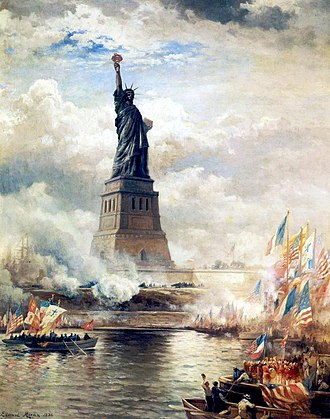The lady's lamp is lit
 On October 28 back in 1886 President Grover Cleveland dedicated the famous Statue of… Well, you know, of course. The Statue of Liberty. It’s a lot more famous than, say, Grover Cleveland, except to nerds who relish his being the only man to serve non-consecutive presidential terms. (And don’t give Bill Clinton any ideas.)
On October 28 back in 1886 President Grover Cleveland dedicated the famous Statue of… Well, you know, of course. The Statue of Liberty. It’s a lot more famous than, say, Grover Cleveland, except to nerds who relish his being the only man to serve non-consecutive presidential terms. (And don’t give Bill Clinton any ideas.)
It is easy to despair over, or despise, the United States. People have been doing it since before the Revolution. And Donald Trump isn’t making it harder. Nor is Hillary Clinton. Nor is the fact that the American government today is so large, aggressive, arrogant and inept that it’s hard to remember that it is a nation founded in liberty and long faithful to that founding. But those symbols do keep trying to remind us, and them.
Of course virtually every nation imagines itself to love “liberty”. But too often in bombastic patriotic odes, anthems and speeches the word means political independence of our tribe, which then denies freedom to its own members and the very humanity of everyone else. In America it meant something so different that the whole world knows the Statue of Liberty and she shows up at protests on the other side of the world.
No Chinese symbol could resonate in American politics in anything like the same way the “Goddess of Liberty” did in Tienanmen Square in 1989. Not even in the negative way that, say, Mao Zedong once did including in the Beatles song “Revolution”. And that gives some grounds for hope. Freedom is so deep in the political DNA of the United States that in a crisis citizens might yet turn to it both instinctively and passionately.
For that matter, some of us nerds also cherish Grover Cleveland because, as a Democratic president, he once vetoed a bill to relieve drought-stricken Texas farmers on the grounds that the Constitution did not empower the federal government to appropriate money from the people generally for the benefit of some particular group.
The sum was just $10,000, perhaps equivalent to a quarter of a million dollars today (and today it is hard to imagine Congress giving so little to anyone). But in vetoing it, one of 584 vetoes he cast in defence of limited government, Cleveland said “I can find no warrant for such an appropriation in the Constitution, and I do not believe that the power and duty of the general government ought to be extended to the relief of individual suffering which is in no manner properly related to the public service or benefit. A prevalent tendency to disregard the limited mission of this power and duty should, I think, be steadfastly resisted, to the end that the lesson should be constantly enforced that, though the people support the government, the government should not support the people.”
He also challenged the people calling on the government to act, especially those working for newspapers, to campaign instead for private donations. And the result was some $100,000 from citizens’ own pockets. Truly a response worthy of a free nation.
The United States, to say nothing of the Democratic Party, has moved an enormous distance away from such politics and from its foundations. But the statue still stands proudly off the southern tip of Manhattan, reminding Americans that if they are not free they are not American. It is not true of the most famous symbols of any other nation, not even Britain. And perhaps the Star Spangled Banner does still wave over the land of the free.